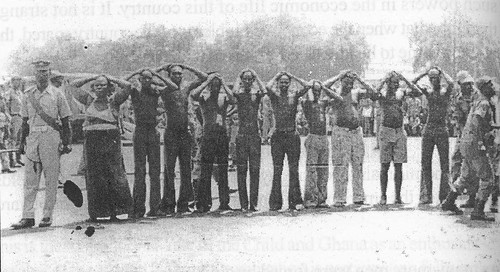July 27, 1979 editorial in The Daily Graphic, Accra, Ghana
This is the International Year of the Child and Ghana as an enthusiastic member of the United Nations Organization is participating fully in the activities being organized as part of the celebrations.
It is impossible to talk about children without including women because the first few critical and formative years of a child's life are intricately linked with the fortunes of the mother.In our country, women have traditionally played important roles in our lives. When the Women's Liberation Movement was at its hysterical height, many were the people who rightly argued that Ghanaian women do not need any libration in the sense that European cultures understand the term.
Ghanaian women have always stood by their male counterparts and have never been treated like fragile dolls, the argument is often made. More than that, the enterprising nature of the Ghanaian woman has often been mentioned with praise, sometimes as a condemnation of the men who are said to "sit under trees playing games and litigating while the women are on the farms".
It must be this enterprising spirit which led to our women assuming such powers in the economic life of this country. It is not strange therefore that when the economic problems of the country soared, the women came to be identified as part of the problem.
They were the ones who, predominant in the retail trade, came to be regarded by the public as the group responsible for the high prices.
The economic realities of the day forced many of them into new fields and we saw the emergence of femail contractors and straightforward crooks.
As many more men were forced by circumstances to abandon their responsibilities towards their families and take refuge outside the country, the women sought avenues fair and foul to look after homes.
Many of them of course simply got carried away by greed and avarice and plundered Ghana shamelessly.
It is no wonder therefore that when the day of reckoning finally dawned, many women have been caught in the net.
The Graphic would be the last to advocate a preferential treatment for female criminals. It is obvious however that the types of punishment being meted out to women, and publictly too, must outrage every decent norm.
If they must be flogged, need they be stripped naked? Where is the Ghanaian sense of decorum and propriety? When did modes of dressing and hairstyles enter the dos and don'ts of the Revolution?
Is it really necessary to degrade our mothers, wives, daughters and future mothers to the point where their very womanhood is trampled upon?
It is bad enough that some very few soldiers are ungentlemanly and cowardly enough to indulge in such acts, but a crying shame for the whole country is that crowds look on and cheer.
This is not an appeal to the spirit of Sir Galahad in the Ghanaian male. It is an appeal to the sense of propriety and responsibility in the Ghanaian male.
Even during a war, women and children are accorded certain considerations; and let us never forget that many of these small-time traders who are being publicly flogged now are more victims than beneficiaries of the system
The Armed Forces Revolutionary Council has issued a statement saying such molestations of women should stop. What about the National Council of Women and Development, when will they notice that anything untoward is happening?

Above: One of countless women (second left in brassier with shaved head) abused by soldiers wo claimed they were "economic saboteurs".
Elizabeth Ohene. July 27, 1979 editorial in The Daily Graphic, Accra, Ghana

See also: June 4th